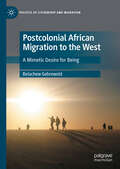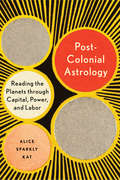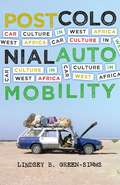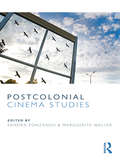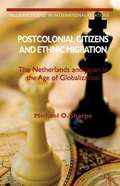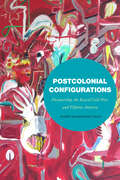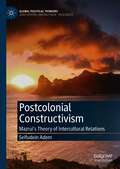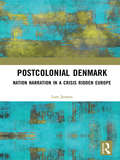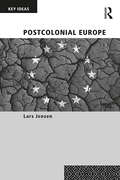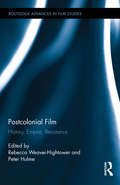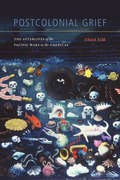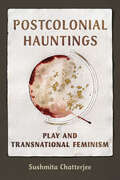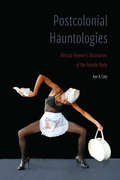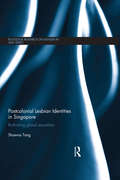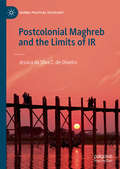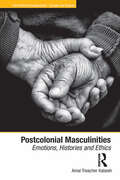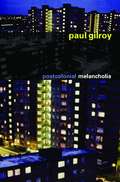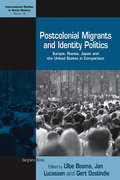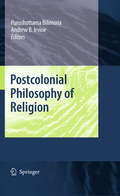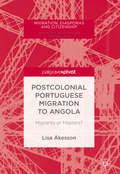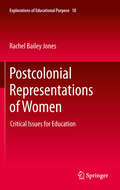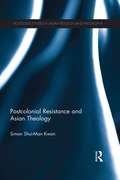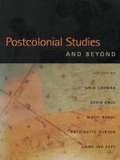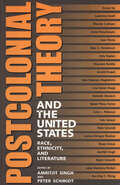- Table View
- List View
Postcolonial African Migration to the West: A Mimetic Desire for Being (Politics of Citizenship and Migration)
by Belachew GebrewoldPostcolonial African migration to the West is not only a spatial movement in search of material and physical security but also an expression of the mimetic desire for being by imitating the West or “whitening” oneself against the background of the dehumanizing historical legacies of slavery, colonialism, and Western dominance. It is a flight from oneself, from perceived inadequacies. To migrate to the West is an expression of the desire for being, not through detachment from the “fascinating” West but rather through adoration and imitation of its lifestyle, beauty ideals, and soft and hard power, and by living in the West. The model (the West) builds ubiquitous anti-migrant physical and virtual fences, which the imitator tries to overcome. The more the model re-strengthens these fences, the more the imitator tries to scale them. The anti-migrant fences are the meeting point of the model’s perceived superiority, admirability, and desirability on the one hand, and on the other hand the imitator’s inferiority complex and inner tension between the paradoxical desire for detachment from the model and its passionate imitation at the same time. This book argues that African migration to the West will continue even in the absence of poverty, conflicts, and climate change because it is also about the mimetic desire for being.
Postcolonial Astrology: Reading the Planets through Capital, Power, and Labor
by Alice Sparkly KatTapping into the political power of magic and astrology for social, community, and personal transformation.In a cross-cultural approach to understanding astrology as a magical language, Alice Sparkly Kat unmasks the political power of astrology, showing how it can be channeled as a force for collective healing and liberation.Too often, magic and astrology are divorced from their potency and cultural contexts: co-opted by neoliberalism, used as a force of oppression, or distilled beyond recognition into applications that belie their individual and collective power. By looking at the symbolic and etymological histories of the sun, moon, Saturn, Venus, Mercury, Mars, and Jupiter, we can trace and understand the politics of magic--and challenge our own practices, interrogate our truths, and reshape our institutions to build better frameworks for communities of care.Fearless, radical, and fresh, Sparkly Kat's Postcolonial Astrology ushers in a new wave of astrology revival, refusing to apologize for its magickism and connecting its power to the spirituality and politics we need now. Intersectional, inclusive, and geared towards queer and POC communities, it uses our historical and collective constructs of the planets, sun, and moon to re-chart our subconscious history, redefine the body in the world, and assert our politics of the personal, in astrology and all things.
Postcolonial Automobility: Car Culture in West Africa
by Lindsey B. Green-SimmsFor more than a century cars have symbolized autonomous, unfettered mobility and an increasingly global experience. And yet, they are often used differently outside the centers of global capitalism. This pioneering book considers how, through the lens of the automobile, we can assess the pleasures, dangers, and limits of global modernity in West Africa. Through new and provocative readings of famous plays, novels, and films, as well as recent popular videos, Postcolonial Automobility reveals the surprising ways in which automobility in the region is, at once, an everyday practice, an ethos, a fantasy of autonomy, and an affective activity intimately tied to modern social life. Lindsey B. Green-Simms begins with the history of motorization in West Africa from the colonial era to the decolonizing decades after World War II, and addresses the tragedy of car accidents through a close reading of Wole Soyinka&’s 1965 postindependence play The Road. Shifting to screen media, she discusses Ousmane Sembene&’s Xala and Jean-Pierre Bekolo&’s Quartier Mozart and reviews popular, low-budget Nollywood films. Finally, Green-Simms considers how feminist texts rewrite and work in dialogue with the male-centered films and novels where the car stands in for patriarchal power and capitalist achievement.Providing a unique perspective on technology in Africa—one refusing to be confined to narratives of either underdevelopment or inevitable progress—and covering a broad range of interdisciplinary material, Postcolonial Automobility will appeal not only to scholars and students of African literature and cinema but also to those in postcolonial and globalization studies.
Postcolonial Cinema Studies
by Sandra Ponzanesi Marguerite WallerThis collection of essays foregrounds the work of filmmakers in theorizing and comparing postcolonial conditions, recasting debates in both cinema and postcolonial studies. Postcolonial cinema is presented, not as a rigid category, but as an optic through which to address questions of postcolonial historiography, geography, subjectivity, and epistemology. Current circumstances of migration and immigration, militarization, economic exploitation, racial and religious conflict, enactments of citizenship, and cultural self-representation have deep roots in colonial/postcolonial/neocolonial histories. Contributors deeply engage the tense asymmetries bequeathed to the contemporary world by the multiple,diverse, and overlapping histories of European, Soviet, U.S., and multi-national imperial ventures. With interdisciplinary expertise, they discover and explore the conceptual temporalities and spatialities of postcoloniality, with an emphasis on the politics of form, the ‘postcolonial aesthetics’ through which filmmakers challenge themselves and their viewers to move beyond national and imperial imaginaries. Contributors include: Jude G. Akudinobi, Kanika Batra, Ruth Ben-Ghiat, Shohini Chaudhuri, Julie F. Codell, Sabine Doran, Hamish Ford, Claudia Hoffmann, Anikó Imre, Priya Jaikumar, Mariam B. Lam, Paulo de Medeiros, Sandra Ponzanesi, Richard Rice, Mireille Rosello and Marguerite Waller.
Postcolonial Citizens and Ethnic Migration
by Michael O. SharpeThis book provides a cross-regional investigation of the role of citizenship and ethnicity in migration, political incorporation, and political transnationalism in the age of globalization, exploring the political realities of Dutch Antilleans in the Netherlands and Latin American Nikkeijin in Japan.
Postcolonial Configurations: Dictatorship, the Racial Cold War, and Filipino America
by Josen Masangkay DiazIn Postcolonial Configurations Josen Masangkay Diaz examines the making of Filipino America through the dynamics of dictatorship, coloniality, and subjectivity. Diaz explores how the Ferdinand Marcos dictatorship and US policies during the Cold War that supported the regime defined the relationship between “Filipino” and “America” in ways that influenced the creation of a gendered and racialized Filipino American subject. By analyzing Philippine-US state programs for military operations, labor and immigration reform, and development and modernization plans, she shows how anticommunist liberalism and authoritarianism shaped the visibility and recognition of new forms of Filipino subjectivity. Tracing the rise of various social formations that emerged under the Marcos regime and US programs for liberal reform, from transnational Filipino and US culture and the immigrant returnee to the New Filipina woman and the humanitarian English teacher, Diaz positions literature, film, periodicals, and other cultural texts against official state records in ways that reconceptualize the meanings of Filipino America in the Cold War.
Postcolonial Constructivism: Mazrui's Theory of Intercultural Relations (Global Political Thinkers)
by Seifudein AdemThis book introduces Ali Mazrui’s delightfully stimulating scholarship about intercultural relations, calling it Postcolonial Constructivism, and shares elements of his intellectual vitality in an original way. It begins with a chronicle of Mazrui’s eventful, sixty-year journey as a scholar of International Relations. It then proceeds to present some of the most remarkable yet least remarked up on features of his intellectualism, including his paradoxes, his perceptive typologies, his neologisms as well as his interactions with historical figures. The book draws on materials which were either unavailable until now or were found scattered in time and space. Designed as an invitation to a wider audience to the supermarket of Mazrui’s ideas, this book also seeks to underscore the timeliness and possible durability of many of his observations about intercultural relations.Thorough, comprehensive and up-to-date, this book is a concise account of the core of Mazrui’s vast body of work. 'Seifudein Adem has done a great service to all of us who focus on learning about and publicizing the contributions of global south scholars to current Western-dominant international relations approaches. In this well-organized work, he manages to synthesize the prolific intellectual contributions of the consummate and outstanding African scholar Ali Mazrui, using what he calls 'postcolonial constructivism', while making clear that Mazrui’s work cannot solely be restricted to prevailing perspectives. At the same time, his personal friendship and close working relationship with Mazrui allow him to offer the reader a unique glimpse of the witty Africanist who was befriended by so many, including major political figures. Given the current drive to “globalize” international relations, this book is a timely contribution that highlights the overlooked, rich narratives of scholars and thinkers from the global south.' —Jacqueline Anne Braveboy-Wagner, Professor, The City University of New York, USA'Ali Mazrui’s remarkable corpus lives, and Seifudein Adem interprets it for today when its salience is undeniable around race, religion etc. Adem’s decade with the maestro maximizes his book’s insights for Africa and the world as both are in flux.'—Timothy M. Shaw, Adjunct Professor, Carleton University and University of Ottawa, Canada'Passionate about preserving African culture and the dignity of her people, Ali Mazrui was never oblivious to the forces of globalization, positive or negative, and hence the emergence of a world federation of cultures in which his scholarship lived, moved and had its being. He was a global scholar who contributed immensely to the analysis and interpretation of various aspects of international relations, social conflicts, the human condition and the future of humankind in a changing world. His ideas quite often sprang from lived experiences and discourses from which he churned chains of books and articles whose styles were peculiar to himself in what came to be referred to as 'Mazruiana'. This book finally tells the story of the genesis and evolution of this body of thought and its contribution to knowledge.'—P. Anyang’ Nyong’o, Professor and Kenyan Politician, Kenya'This is the ultimate compendium of Ali Mazrui’s interactions with men and women of power, among others, including several presidents and prime ministers. It also captures Mazrui’s unique approach to scholarship and has a large collection of his deeply thoughtful paradoxes and analytical categories.'—Amadu Jacky Kaba, Professor, Seton Hall University, USA
Postcolonial Denmark: Nation Narration in a Crisis Ridden Europe
by Lars JensenThis book adopts a global approach to analysing Danish nationhood in the current context of a Europe paralysed by crises. Focusing on the global strands which have produced understandings of national selfhood as a consequence of a series of historical and contemporary global encounters, it calls for the production of narratives which better capture how European nations, including Denmark, are shaped by narratives that cannot be understood in (national) isolation, but are contingent on ideas about the nation’s globality. In historical terms, this entails examining how colonialism shaped national self-perceptions; in a contemporary context, it requires looking at colonialism’s unfinished business. The first chapters revisits colonialism throughout the Danish empire. In the second section, the book revisits Danish (post-1945) attempts to restage global interventions and military intervention since 2000, and considers how migration since 1965 has led to a profound questioning of relationships with the non-European world – and increasingly with Europe itself. Postcolonial Denmark situates Denmark at the centre of a number of current and ever more urgent challenges facing Europe. As such, it will appeal to scholars of sociology, political science and cultural studies with interests in Europe, the Nordic region through a postcolonial, a whiteness and a decolonial inspired approach.
Postcolonial Europe (Key Ideas)
by Lars JensenThis book presents an overview of the direct and indirect ways in which Europe continues to be influenced by its entrenched postcolonial condition. Exploring the notion of postcolonial Europe as it characterises a Europe caught at a number of crossroads, it considers the distinctly European features of a range of global crises by which Europe is beset, relating to migration, nationalism, internationalism, climate change and inequality. Linking these to the legacy of European hegemony during the era of high imperialism and the inability to come to terms with the region’s increasingly provincialised status, the reversal of migrant flows following the implosion of European empires, and the dismantling of welfare societies initially made possible by the accumulation of wealth during colonialism, the author examines the gradual disintegration of the idea of the European collectivity and the erosion of the idea that Europe is a dispenser of privileged status. A wide-ranging study of Europe’s crisis in its postcolonial era, this volume will appeal to scholars of critical sociology, political geography, cultural studies, anthropology, political science and history with interests in colonialism and postcolonialism.
Postcolonial Film: History, Empire, Resistance (Routledge Advances in Film Studies #30)
by Peter Hulme Rebecca Weaver-HightowerPostcolonial Film: History, Empire, Resistance examines films of the later twentieth and early twenty-first centuries from postcolonial countries around the globe. In the mid twentieth century, the political reality of resistance and decolonization lead to the creation of dozens of new states, forming a backdrop to films of that period. Towards the century’s end and at the dawn of the new millennium, film continues to form a site for interrogating colonization and decolonization, though against a backdrop that is now more neo-colonial than colonial and more culturally imperial than imperial. This volume explores how individual films emerged from and commented on postcolonial spaces and the building and breaking down of the European empire. Each chapter is a case study examining how a particular film from a postcolonial nation emerges from and reflects that nation’s unique postcolonial situation. This analysis of one nation’s struggle with its coloniality allows each essay to investigate just what it means to be postcolonial.
Postcolonial Grief: The Afterlives of the Pacific Wars in the Americas
by Jinah KimIn Postcolonial Grief Jinah Kim explores the relationship of mourning to transpacific subjectivities, aesthetics, and decolonial politics since World War II. Kim argues that Asian diasporic subjectivity exists in relation to afterlives because the deaths of those killed by U.S. imperialism and militarism in the Pacific remain unresolved and unaddressed. Kim shows how primarily U.S.-based Korean and Japanese diasporic writers, artists, and filmmakers negotiate the necropolitics of Asia and how their creative refusal to heal from imperial violence may generate transformative antiracist and decolonial politics. She contests prevalent interpretations of melancholia by engaging with Frantz Fanon's and Hisaye Yamamoto's decolonial writings; uncovering the noir genre's relationship to the U.S. war in Korea; discussing the emergence of silenced colonial histories during the 1992 Los Angeles riots; and analyzing the 1996 hostage takeover of the Japanese ambassador's home in Peru. Kim highlights how the aesthetic and creative work of the Japanese and Korean diasporas offers new insights into twenty-first-century concerns surrounding the state's erasure of military violence and colonialism and the difficult work of remembering histories of war across the transpacific.
Postcolonial Hauntings: Play and Transnational Feminism (Dissident Feminisms)
by Sushmita ChatterjeeOften examined separately, play and hauntings in fact act together to frame postcolonial issues. Sushmita Chatterjee showcases their braided workings in social and political fabrics. Drawing on this intertwined idea of play and hauntings, Chatterjee goes to the heart of conundrums within transnational postcolonial feminisms by examining the impossible echoes of translations, differing renditions of queer, and the possibilities of solidarity beyond the fraternal friendships that cement nation-states. Meaning-plays, or slippages through language systems as we move from one language to another, play a pivotal role in a global world. As Chatterjee shows, an attentiveness to meaning-plays discerns the past and present, here and there, and moves us toward responsive ethics in our theories and activisms. Insightful and stimulating, Postcolonial Hauntings centers the inextricable work of play and hauntings as a braided ethics for postcolonial transnational struggles.
Postcolonial Hauntologies: African Women's Discourses of the Female Body (Expanding Frontiers: Interdisciplinary Approaches to Studies of Women, Gender, and Sexuality)
by Ayo A. ColyPostcolonial Hauntologies is an interdisciplinary and comparative analysis of critical, literary, visual, and performance texts by women from different parts of Africa. While contemporary critical thought and feminist theory have largely integrated the sexual female body into their disciplines, colonial representations of African women’s sexuality “haunt” contemporary postcolonial African scholarship which—by maintaining a culture of avoidance about women’s sexuality—generates a discursive conscription that ultimately holds the female body hostage. Ayo A. Coly employs the concept of “hauntology” and “ghostly matters” to formulate an explicative framework in which to examine postcolonial silences surrounding the African female body as well as a theoretical framework for discerning the elusive and cautious presences of female sexuality in the texts of African women. In illuminating the pervasive silence about the sexual female body in postcolonial African scholarship, Postcolonial Hauntologies challenges hostile responses to critical and artistic voices that suggest the African female body represents sacred ideological-discursive ground on which one treads carefully, if at all. Coly demonstrates how “ghosts” from the colonial past are countered by discursive engagements with explicit representations of women’s sexuality and bodies that emphasize African women’s power and autonomy.
Postcolonial Lesbian Identities in Singapore: Re-thinking global sexualities (Routledge Research on Gender in Asia Series)
by Shawna TangTaking lesbians in Singapore as a case study, this book explores the possibility of a modern gay identity in a postcolonial society, that is not dependent on Western queer norms. It looks at the core question of how this identity can be reconciled with local culture and how it relates to global modernities and dominant understandings of what it means to be queer. It engages with debates about globalization, post-colonialism and sexuality, while emphasising the specificity, diversity and interconnectedness of local lesbian sexualities.
Postcolonial Maghreb and the Limits of IR (Global Political Sociology)
by Jessica da OliveiraThis book explores narratives produced in the Maghreb in order to illustrate shortcomings of imagination in the discipline of international relations (IR). It focuses on the politics of narrating postcolonial Maghreb through a number of writers, including Abdelkebir Khatibi, Fatema Mernissi, Kateb Yacine and Jacques Derrida, who explicitly embraced the task of (re)imagining their respective societies after colonial independence and subsequent nation-building processes. Narratives are thus considered political acts speaking to the turbulent context in which postcolonial Maghrebian Francophone literature emerges as sites of resistance and contestation. Throughout the chapters, the author promotes an encounter between narratives from the Maghreb and IR and makes a case for the kinds of thinking and writing strategies that could be used to better approach international and global studies.
Postcolonial Masculinities: Emotions, Histories and Ethics (The\feminist Imagination - Europe And Beyond Ser.)
by Amal Treacher KabeshExploring the similarities and differences between and across masculinities in the Middle East and the West, Postcolonial Masculinities avoids the constant reinforcement of divisions and stereotypes created by the process of 'othering' and the problematic discourse of the clash of civilisations, examining instead how subjectivities in Western and Arab societies are intertwined, operating through envy of the other and the desire to be at once the same and yet fundamentally separate. With a focus on England and Egypt, this book reveals the manner in which masculinities are shaped in and through a history of colonialism and postcolonialism, irrespective of colour, ethnicity, religion, class, sexuality, or the wishes of the individual. By concentrating on the shared ground of postcolonial, masculine subjectivities, Postcolonial Masculinities looks beyond the dissonance often iterated between the apparently rational Western man and the apparently oppressive, patriarchal Middle Eastern man. Shedding light on the shared and distinctive aspects of masculinities across the Middle East and the West, whilst illuminating the influences upon them, this book will appeal to social scientists with interests in cultural studies, masculinities, psychoanalytic theory, gender and sexuality, and colonialism and postcolonialism.
Postcolonial Melancholia (The Wellek Library Lectures)
by Paul GilroyIn an effort to deny the ongoing effect of colonialism and imperialism on contemporary political life, the death knell for a multicultural society has been sounded from all sides. That's the provocative argument Paul Gilroy makes in this unorthodox defense of the multiculture. Gilroy's searing analyses of race, politics, and culture have always remained attentive to the material conditions of black people and the ways in which blacks have defaced the "clean edifice of white supremacy." In Postcolonial Melancholia, he continues the conversation he began in the landmark study of race and nation 'There Ain't No Black in the Union Jack' by once again departing from conventional wisdom to examine—and defend—multiculturalism within the context of the post-9/11 "politics of security."This book adapts the concept of melancholia from its Freudian origins and applies it not to individual grief but to the social pathology of neoimperialist politics. The melancholic reactions that have obstructed the process of working through the legacy of colonialism are implicated not only in hostility and violence directed at blacks, immigrants, and aliens but in an inability to value the ordinary, unruly multiculture that has evolved organically and unnoticed in urban centers. Drawing on the seminal discussions of race begun by Frantz Fanon, W. E. B. DuBois, and George Orwell, Gilroy crafts a nuanced argument with far-reaching implications. Ultimately, Postcolonial Melancholia goes beyond the idea of mere tolerance to propose that it is possible to celebrate the multiculture and live with otherness without becoming anxious, fearful, or violent.
Postcolonial Migrants And Identity Politics
by Ulbe Bosma Jan Lucassen Gert OostindieThese transfers of sovereignty resulted in extensive, unforeseen movements of citizens and subjects to their former countries. The phenomenon of postcolonial migration affected not only European nations, but also the United States, Japan and post-Soviet Russia. The political and societal reactions to the unexpected and often unwelcome migrants was significant to postcolonial migrants' identity politics and how these influenced metropolitan debates about citizenship, national identity and colonial history. The contributors explore the historical background and contemporary significance of these migrations and discuss the ethnic and class composition and the patterns of integration of the migrant population.
Postcolonial Philosophy of Religion
by Andrew B. Irvine Purushottama BilimoriaThe essays in this volume take up the history of philosophy of religion and contemporary problems within the discipline. They pursue these tasks as opportunities to correct Eurocentric biases that distort knowledge not only of religions originating beyond the West, but of the West's own traditions. This is the first collection of its kind. The contributions re-examine colonial experience in India and the Americas, offering discussion of broad methodological issues, critical re-readings of influential Western interpreters of religion, and arguments that explore blindspots and insights typical of colonial difference when viewed through "non-Western" eyes. The volume is aimed at advanced undergraduates, graduate students, and professional scholars in philosophy, religion, and related fields. Readers will benefit from its broad coverage of regions, traditions and problems, and the balance of philosophical critique and reconstruction.
Postcolonial Portuguese Migration to Angola: Migrants or Masters? (Migration, Diasporas and Citizenship)
by Lisa ÅkessonGrounded in extensive and original ethnographic fieldwork, this book makes a novel contribution to migration studies by examining a European labour migration to the Global South, namely contemporary Portuguese migration to Angola in a postcolonial context. In doing so, it explores everyday encounters at work between the Portuguese migrants and their Angolan “hosts”, and it analyses how the Luso-African postcolonial heritage interplays with the recent Portuguese-Angolan migration in the (re-)construction of power relations and identities. Based on ethnographic interviews, the book describes the Angolan-Portuguese relationship as characterized not only by hierarchies of power, but also by ambivalence and hybridity. This research demonstrates that the identities of the ex-colonized Angolan and the Portuguese ex-colonizer are shaped by a history of unequal and violent power relations. Further, it reveals how this history has produced a sense of intimacy between the two, and the often fraught nature of this relationship. Combining a strong connection to the field of migration studies with a postcolonial perspective, this original work will appeal to students and scholars of migration, postcolonial studies, the sociology of work and African Studies.
Postcolonial Representations of Women: Critical Issues for Education
by Rachel Bailey JonesIn this accessible combination of post-colonial theory, feminism and pedagogy, the author advocates using subversive and contemporary artistic representations of women to remodel traditional stereotypes in education. It is in this key sector that values and norms are molded and prejudice kept at bay, yet the legacy of colonialism continues to pervade official education received in classrooms as well as 'unofficial' education ingested via popular culture and the media. The result is a variety of distorted images of women and gender in which women appear as two-dimensional stereotypes. The text analyzes both current and historical colonial representations of women in a pedagogical context. In doing so, it seeks to recast our conception of what 'difference' is, challenging historical, patriarchal gender relations with their stereotypical representations that continue to marginalize minority populations in the first world and billions of women elsewhere. These distorted images, the book argues, can be subverted using the semiology provided by postcolonialism and transnational feminism and the work of contemporary artists who rethink and recontextualize the visual codes of colonialism. These resistive images, created by women who challenge and subvert patriarchal modes of representation, can be used to create educational environments that provide an alternative view of women of non-western origin.
Postcolonial Resistance
by David JefferessDespite being central to the project of postcolonialism, the concept of resistance has received only limited theoretical examination. Writers such as Frantz Fanon, Edward Said, and Homi K. Bhabha have explored instances of revolt, opposition, or subversion, but there has been insufficient critical analysis of the concept of resistance, particularly as it relates to liberation or social and cultural transformation. In Postcolonial Resistance, David Jefferess looks to redress this critical imbalance.Jefferess argues that interpreting resistance, as these critics have done, as either acts of opposition or practices of subversion is insufficient. He discerns in the existing critical literature an alternate paradigm for postcolonial politics, and through close analyses of the work of Mohandas Gandhi and the South African reconciliation project, Postcolonial Resistance seeks to redefine resistance to reconnect an analysis of colonial discourse to material structures of colonial exploitation and inequality. Engaging works of postcolonial fiction, literary criticism, historiography, and cultural theory, Jefferess conceives of resistance and reconciliation as dependent upon the transformation of both the colonial subject and the antagonistic nature of colonial power. In doing so, he reframes postcolonial conceptions of resistance, violence, and liberation, thus inviting future scholarship in the field to reconsider past conceptualizations of political power and opposition to that power.
Postcolonial Resistance and Asian Theology
by Simon Shui-Man KwanPresenting a fundamental re-thinking of Asian theology, this book focuses on theological indigenization in Asia in light of the postcolonial theory of resistance advanced by Homi K. Bhabha, among others. Two types of anti-colonialist resistance within Asian theologies are identified and interrogated. The first is nationalistic in kind, operating from a theological language that is binaristic and oppositional. The second is illustrated by that which was mounted by the three Chinese Christian thinkers whose indigenous theologies are analysed in this book as case studies. This second kind, postcolonial in its character, is characterized by collaboration rather than antagonistic binarism. In spite of much dissimilarity between these two kinds of resistance, the book argues that they are similarly anti-colonialist, and both can be equally valid in resisting colonial forces. Given that the binarism and antagonism imbedded in the Asian theological movement are historically contingent, and that the sole reliance on this resistance has made the movement self-ensnaring, the book suggests that the Asian theological movement widen its choice of colonial-resistant strategies. Drawing attention to the otherwise subtle politics of the Asian theological indigenization discourse, this book addresses the relationship between postcolonialism and Asia contextual theology, and is of interest to students and scholars of Asian Religion and Philosophy.
Postcolonial Studies and Beyond
by Suvir Kaul Jed Esty Matti Bunzl Antoinette Burton Ania LoombaAn interdisciplinary collection of essays designed to map out a wide-ranging and productive future for postcolonial studies, this volume assesses the current state of the field and points toward its most promising new developments. In addressing questions about the definition and relevance of postcolonial scholarship, many of the essays consider its relation to the study of globalization. While some contributors offer broad reflections on the existing two-way influence between postcolonial theory and established university disciplines such as literary criticism and history, others forge ahead into some vital, if nascent, areas for postcolonial research such as media studies, environmental studies, religious studies, and linguistic and semantic analysis.The contributors represent many of the fields altered by postcolonial studies over the past two decades, including literary studies, history, anthropology, Asian and African studies, and political science. They model diverse applications of postcolonial theory to Latin America, East Asia, the Middle East, and the United States. Postcolonial Studies and Beyond propels the field forward. It showcases scholars coming from intellectual precincts usually considered outside the purview of the postcolonial finding new ways to deploy classic techniques of postcolonial analysis, and scholars strongly associated with postcolonial studies offering substantial critiques designed to challenge the field's most fundamental assumptions.Contributors. Tani E. Barlow, Ali Behdad, Daniel Boyarin, Timothy Brennan, Matti Bunzl, Antoinette Burton, Laura Chrisman, Jean Comaroff, Frederick Cooper, Vilashini Cooppan, Jed Esty, James Ferguson, Peter Hulme, Suvir Kaul, Neil Lazarus, Ania Loomba, Florencia E. Mallon, Nivedita Menon, Rob Nixon, Elizabeth A. Povinelli, David Scott, Ella Shohat, Kelwyn Sole, Robert Stam, Rebecca L. Stein
Postcolonial Theory and the United States: Race, Ethnicity, and Literature
by Peter Schmidt Amritjit SinghAt the beginning of the twenty-first century, we may be in a “transnational” moment, increasingly aware of the ways in which local and national narratives, in literature and elsewhere, cannot be conceived apart from a radically new sense of shared human histories and global interdependence. To think transnationally about literature, history, and culture requires a study of the evolution of hybrid identities within nation-states and diasporic identities across national boundaries. Studies addressing issues of race, ethnicity, and empire in US culture have provided some of the most innovative and controversial contributions to recent scholarship. Postcolonial Theory and the United States: Race, Ethnicity, and Literature represents a new chapter in the emerging dialogues about the importance of borders on a global scale. This book collects nineteen essays written in the 1990s in this emergent field by both well established and up-and-coming scholars. Almost all the essays have been either especially written for this volume or revised for inclusion here. These essays are accessible, well-focused resources for college and university students and their teachers, displaying both historical depth and theoretical finesse as they attempt close and lively readings. The anthology includes more than one discussion of each literary tradition associated with major racial or ethnic communities. Such a gathering of diverse, complementary, and often competing viewpoints provides a good introduction to the cultural differences and commonalities that comprise the United States today. The volume opens with two essays by the editors: first, a survey of the ideas in the individual pieces, and, second, a long essay that places current debates in US ethnicity and race studies within both the history of American studies as a whole and recent developments in postcolonial theory.
